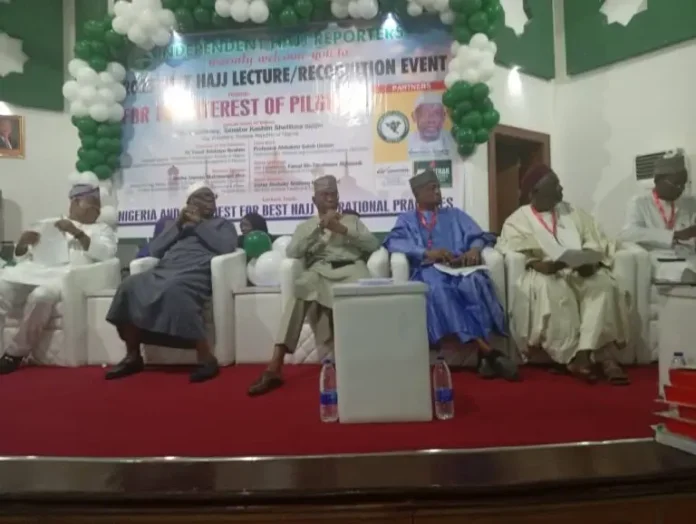News Investigators/ Abdullahi Usman, the Chairman of the National Hajj Commission of Nigeria (NAHCON) has urged journalists to use the media to foster existing unity among Nigerians.
Prof. Usman gave the advice on Thursday at the 2025 Post Hajj Lectures and Awards organised by the Independent Hajj Reporters in Abuja.
He was represented by the NAHCON Commissioner of Operations, Prince Anofi Elegushi
The theme of the event was, “For the Interest of the Pilgrims”.
The NAHCON boss urged journalists to report the Hajj operation the way it unfolded, cautioning them not to report lies against the personality of people in the Hajj industry.
“Media is not to destroy the nation. Let us use media to build our naexistiand to foster unity, not to destroy the existing unity among us.
“I want to urge media practitioners to report e events as they are. You are closer to the people and your information moves more faster. Please, before you publish, filter your information,” he said.
He said that one of the key things in Islam was the truth.
“If you are reporting lies against the personality of anybody, you are offending the government.
“So please, make sure you filter out the information before you put it into the media space. We thank the management of the Independent Hajj Reporters. They have been doing a lot,” he said.
The NAHCON boss also urged relevant stakeholders not to see Hajj operation as
an ordinary exercise.
According to him, whatever you do, you will be judged.
He dedicated the successes of the 2025 Hajj to the state Muslims pilgrims welfare boards/commissions for their understanding and collaboration with NAHCON.
“If we are discussing the successes of Hajj today, especially the 2025 Hajj, we can not do that without appreciating the state executives for their collaboration on understanding.
“Without them, these successes can not be recorded,” he said.
In his keynote address, Ustaz Abubakar Siddeeq, Managing Director, Comerel Travels and Tours Ltd., called for digitalised and humanised Hajj operations in Nigeria.
Siddeeq, who presented a paper on “Nigeria and the Quest for the Best Hajj Operations Practices” said that it was geared towards dignified, efficient and accountable Hajj operations in Nigeria.
According to him, a digital allocation tool, integrated with airline updates, can harmonise flight and lodging logistics, ensuring pilgrims are never stranded or left uncertain about where they will stay or when they depart.
“Transport constitutes a critical artery that must be optimised to preserve energy for the sacred rites.
“The Haramain High-Speed Railway offers a compelling model for reducing fatigue and risk, provided that capacity, accessibility, and seamless integration with Masaar and flight schedules are guaranteed.
“Where rail capacity remains uncertain, a robust multi-modal contingency plan, without compromising the pilgrim’s comfort or dignity, will safeguard the journey against disruptions,” he said.
He said that feeding arrangements must be governed by integrity, consistency and a commitment to nutritional value.
“The proposed shift toward hotel-based, half-board catering in Madinah (and a mirrored approach in Makkah) should be anchored by auditable contracts, floor-based service scheduling, and independent oversight.
“This is to curb inefficiencies and ensure that meals meet hygienic and nutritional standards.
“The overarching aim is to deliver reliable, high-quality meals that reflect the value the pilgrim has entrusted to the operator.”
NAN


